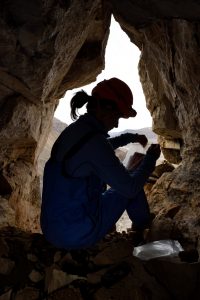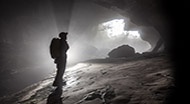
Dr Gina Moseley from the Innsbruck Quaternary Research Group will receive one of this year’s prestigious Austrian Science Foundation (FWF) START prizes. The START programme is an Austrian initiative to support and strengthen outstanding research projects in science and humanities.
Gina, a member of the University of Bristol Spelaeological Society and current Symposium Lecture Secretary of the BCRA has been chosen for her research into climate change in the Arctic, as part of the Greenland Caves Project. This work began in 2015 with the visit of a 5-person team to the Arctic to explore, survey, photograph and take samples from caves in Northeast Greenland. In 2018, this work has extended into a new area as part of a Top to Top Global Climate Expedition where they will be exploring potential new cave sites.
The €1.1 million START prize from the Fund for the Promotion of Scientific Research is aimed at top young scientists from all disciplines, who are given the opportunity to plan their long-term research on a financially secure basis.
The Arctic region is expected to experience some of the greatest climate and environmental changes over the next few centuries because of climate change, the consequences of which will be felt worldwide, for example, by rising sea levels and changes in weather systems in the northern hemisphere. Improving the understanding of how the Arctic will develop in a warmer world is therefore a high priority. One of the ways to achieve this is to study warmer periods in the recent geological past.

Northeast Greenland is one of the areas of the Arctic that are expected to experience the biggest changes. Only very scant information is known about the climate history of this area. The main motivation of the Northeast Greenland speleothem project is to close this fundamental knowledge gap with the help of an innovative climate archive, sinter deposits in caves, also known as speleothems. Today the area where the caves are located is dry and the ground is permanently frozen so that no speleothems can form. From a pilot study by Gina, it is known that this region must have been warmer and wetter in the past. The START Prize funds will enable her to undertake a large expedition to Northeast Greenland, where further caves will be visited, and extensive samples will be taken. These will then be analyzed using state-of-the-art methods. The objectives of the project are the periods in Greenland’s recent geological past, when it was warmer and wetter than it is today, with the aim of reconstructing the stability of the climate at these intervals, studying the seasonality of climate change of past warm periods and accurately recording their temperature changes.
The pilot study has already shown that the speleothems formed in northeastern Greenland in the period from 600,000 to 400,000 years ago. In comparison, the formations in the caves of Central Greenland only reach a maximum age of 128,000 years. As part of this START project, the world’s first Arctic Speleothem Research Group will be established at the University of Innsbruck. It will transform the field of palaeoclimatology by opening up a new Arctic archive for investigation..
Dr. Gina Moseley (34) studied Physical Geography at the University of Birmingham and obtained a PhD at the University of Bristol. She has been working at the University of Innsbruck since 2011, first as a postdoc and since 2015 as a FWF Hertha Firnberg Fellow. Gina has received several other awards for her previous scientific achievements.
Gina told Darkness Below: “This is a really fantastic opportunity to now concentrate on cave-based Arctic research for the next six years, which I could never have imagined back when I was a student talking to Charlie Self about caves in Greenland on a weekly UBSS pub meet.”
The Greenland Caves Project can be followed on Instagram, Facebook and Twitter.
